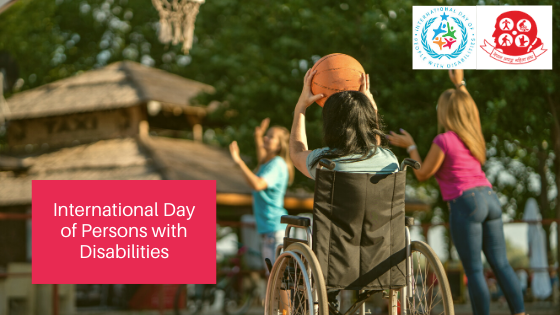“Building Back Better: toward a disability-inclusive, accessible and sustainable post COVID-19 World”.
Background of the day
The global debate on the rights of persons with disabilities began shortly after the United Nations declared 1981 the International Year of Persons with Disabilities. The passage of the 10-year World Disability Action Plan in 1982 to work for the rights of persons with disabilities worldwide also declared the period from 1983 to 1992 as the World Disability Decade to motivate member states to include persons with disabilities as other citizens. In 1992, the last year of the International Disability Decade, the United Nations called on all member states to observe December 3 as World Disability Day each year, and since that year, December 3 has been celebrated worldwide. Nepal has been celebrating the International Day of Persons with Disabilities every year since that year. However, looking back at the history of Nepal, Bikram Samvat has been working in the field of education, health and rehabilitation in Nepal since 2020 BS. In Bikram Sambat 2039 BS, the government implemented a new law on disability “Protection and Welfare of the Disabled Act”. Similarly, the Disability Protection and Welfare Rules and Special Education Policy were implemented in Bikram Sambat 2051 BS. With the introduction of the Act and policies, some targeted programs in education, health, treatment and rehabilitation for persons with disabilities began to be implemented by the government and non-government sectors. However, the attitude and behavior towards people with disabilities was based on compassion and benevolence. Therefore, in the context of the global demand for human rights, a rights-oriented concept regarding persons with disabilities has been developing.
There is no uniformity in the disability data and the data brought by the government from the census is not comparable to the international data. For example, according to the census report of 2058 BS, it is 0.47 percent of the total population and according to the census of 2068 BS, it is 1.94 percent. According to a 2011 report by the World Health Organization and the World Bank, people with disabilities make up 10 to 15 percent of the world’s population, with most (about 80 percent) living in developing and underdeveloped countries. Preparations are in full swing for the census to be conducted every 10 years in the coming rainy season 2078 BS and we are also extensively advocating for disability women friendly census and official statistics.
The overall issue of disability cannot be human rights friendly and inclusive. Addressing the diversity within the disability is a challenge, but the global impact of the global Covid 19 corona virus epidemic is making life even more difficult for people with disabilities. Even within the disability, the condition of women is becoming more miserable. If there is discrimination at home, then the discriminatory system by the society and the state has become another obstacle. At the same time, due to the spread of gender discrimination and patriarchal thinking and values, women with disabilities have become more marginalized by being deprived of domestic violence, humiliation, various kinds of stigma and opportunities. Incidents of rape are coming out on a daily basis when parents and women living with the help of others, including those with intellectual disabilities, multiple disabilities and psychosocial disabilities, are not even able to claim that they have been subjected to violence. Are
We are also celebrating a 16-day campaign against gender-based violence, but seeing that leaders and the government are not interested in the issue of women with disabilities, we are forced to feel that the law is on one side and the issue is not a priority. The success of our campaign to enable women to speak out against all forms of discrimination, violence and injustice against women with disabilities and to empower them at home requires the inclusive campaign and the overall human rights movement and women’s rights movement as a common issue. There is an urgent need to prioritize today. Disability-friendly physical communication, inclusive education, sign language information and communication, Braille and audio materials, intellectual disability, autism, psychosocial disability, support services for cerebral palsy disability, spinal cord injury, essential health care, I would like to express my best wishes to make everyone aware of the factors and the importance and availability of daily essential medicines and essential aids.
“Women-friendly census is today’s need
Everyone’s commitment to a fair legal framework and official statistics. ”
Tika Dahal
Nepal Disabled Women’s Association, President, Women’s Rights Activist
ndwa.2009@gmail.com

 Nepali
Nepali
